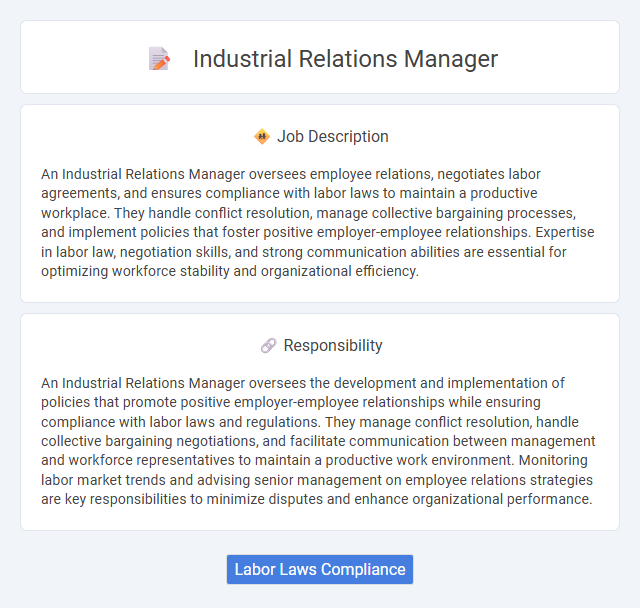
An Industrial Relations Manager oversees employee relations, negotiates labor agreements, and ensures compliance with labor laws to maintain a productive workplace. They handle conflict resolution, manage collective bargaining processes, and implement policies that foster positive employer-employee relationships. Expertise in labor law, negotiation skills, and strong communication abilities are essential for optimizing workforce stability and organizational efficiency.
Individuals with strong interpersonal skills and a keen sense of fairness are likely to thrive as Industrial Relations Managers, as the role demands effective conflict resolution and negotiation abilities. Those who are comfortable working in high-pressure environments and handling complex labor issues may find this position particularly suitable. Candidates lacking patience or who struggle with communication might face challenges in adapting to the dynamic and often sensitive nature of industrial relations.
Qualification
An Industrial Relations Manager typically requires a bachelor's degree in Human Resources, Business Administration, or Industrial Relations, with many employers preferring a master's degree or professional certification such as SHRM-CP or CIPD. Strong knowledge of labor laws, collective bargaining, conflict resolution, and employee relations is essential to effectively manage workplace disputes and negotiate labor agreements. Proven experience in managing employee relations, negotiation skills, and excellent communication abilities are critical qualifications for success in this role.
Responsibility
An Industrial Relations Manager oversees the development and implementation of policies that promote positive employer-employee relationships while ensuring compliance with labor laws and regulations. They manage conflict resolution, handle collective bargaining negotiations, and facilitate communication between management and workforce representatives to maintain a productive work environment. Monitoring labor market trends and advising senior management on employee relations strategies are key responsibilities to minimize disputes and enhance organizational performance.
Benefit
An Industrial Relations Manager is likely to enjoy significant benefits such as improved workplace harmony and reduced conflict, which can lead to higher employee satisfaction and productivity. There is a strong probability that organizational costs related to disputes and legal issues may decrease under their management. Effective handling of industrial relations might also enhance the company's reputation and foster long-term employee loyalty.
Challenge
The role of an Industrial Relations Manager likely involves navigating complex disputes between management and employees, requiring strong negotiation and conflict resolution skills. Challenges may include managing labor contracts, ensuring compliance with labor laws, and maintaining productive workplace relations amid changing regulations. The position probably demands balancing company goals with employee rights to minimize industrial actions and foster a collaborative environment.
Career Advancement
Industrial relations managers play a crucial role in navigating employee-employer dynamics and ensuring compliance with labor laws, which positions them for leadership roles in HR and corporate management. Advancing in this field often requires gaining expertise in conflict resolution, labor law, and strategic negotiation, enabling progression to senior management or director-level positions. Earning certifications such as the Society for Human Resource Management (SHRM) or Chartered Institute of Personnel and Development (CIPD) can significantly enhance career growth opportunities.
Key Terms
Labor Laws Compliance
An Industrial Relations Manager ensures strict adherence to labor laws and regulations, minimizing legal risks and fostering a compliant workplace environment. They conduct regular audits, implement policies aligned with National Labor Relations Act, Fair Labor Standards Act, and Occupational Safety and Health Administration standards, and address employee grievances related to labor disputes. Expertise in collective bargaining agreements and dispute resolution is crucial to maintaining harmonious employer-employee relationships and upholding labor law compliance.
 kuljobs.com
kuljobs.com